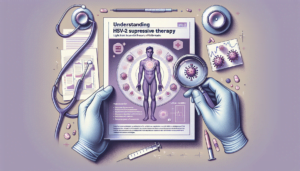Have you ever wondered how long you can have herpes without even realizing it? It’s a question that many people are curious about, as herpes is a common viral infection that can be easily spread. In this article, we’ll explore the potential timeline of herpes infections and discuss the importance of getting tested to ensure your sexual health. So, let’s dive into this topic and shed some light on how long herpes can go unnoticed.


Symptoms of Herpes
Early Symptoms of Herpes
When it comes to herpes, early detection is crucial for effective management. The early symptoms of herpes can vary from person to person, but they typically include itching, tingling, or burning sensations in the affected area. This is often followed by the appearance of small, red bumps or blisters that can be painful and may rupture after a few days. These blisters can then turn into open sores or ulcers before eventually scabbing over and healing. It’s important to note that these symptoms may not always be present, especially during the initial outbreak.
Asymptomatic Herpes
Some individuals infected with herpes may experience no noticeable symptoms at all, leading to what is known as asymptomatic herpes. This means that you can still transmit the virus to others even if you are not experiencing any visible signs. It is estimated that up to 80% of people with herpes may not realize they are infected, making it even more important to get tested regularly if you are sexually active.
Symptoms of Herpes in Men
The symptoms of herpes can manifest differently in men compared to women. In men, the initial outbreak often involves the appearance of small blisters or sores on or around the genitals, as well as the anus. These blisters or sores can be painful and may cause discomfort during urination. Other symptoms may include itching, tingling, and flu-like symptoms such as fever and body aches. It is important for men to be aware of these symptoms and seek medical attention if they suspect they may have contracted herpes.
Symptoms of Herpes in Women
Herpes symptoms in women can be similar to those in men, but they may also experience additional signs. In addition to the appearance of blisters or sores around the genitals and anus, women may also notice abnormal vaginal discharge and pelvic pain. They may also experience flu-like symptoms such as fever, headache, and swollen lymph nodes. It is crucial for women to pay attention to these symptoms and consult with a healthcare professional for proper diagnosis and treatment.
Symptoms of Herpes in Babies
Newborns can contract herpes during birth if their mother has an active herpes infection. Symptoms of herpes in babies may include skin rashes, blisters, mouth sores, and eye infections. It is important for parents to seek immediate medical attention if they notice any unusual symptoms in their newborn, as herpes in babies can be serious and potentially life-threatening if left untreated.
Transmission and Incubation Period
How Herpes Spreads
Herpes is primarily transmitted through direct skin-to-skin contact with an infected individual. This can occur during sexual activities such as vaginal, anal, or oral sex, even if there are no visible symptoms present. The virus can also be spread through non-sexual contact, such as through kissing, sharing utensils or towels, or by touching the affected area and then touching another part of the body. It’s important to remember that herpes can be transmitted regardless of the use of barrier methods like condoms, as they do not cover the entire affected area.
Incubation Period of Herpes
The incubation period of herpes refers to the time it takes for symptoms to appear after initial exposure to the virus. For most people, this period ranges from 2 to 12 days, although it can take longer in some cases. It’s important to note that during the incubation period, herpes can still be transmitted to others, even if symptoms are not yet present. This is why it is crucial to practice safe sex and get tested regularly if you believe you may have been exposed to the virus.
Transmission without Symptoms
One of the challenges with herpes is that it can be transmitted even when no symptoms are present. This can make it difficult to know if you or your partner have the virus. Asymptomatic shedding, which occurs when the virus is being released from the skin without any visible signs, can happen at any time, making transmission possible during periods of apparent wellness. Regular testing and open communication with sexual partners are key to managing the risk of transmission.
Testing and Diagnosis
Types of Herpes Tests
There are several different types of tests available to diagnose herpes. These can include viral culture, polymerase chain reaction (PCR) test, blood tests (such as antibody tests or PCR tests on blood samples), and antigen detection tests. Each type of test has its own advantages and limitations, so it is important to consult with a healthcare professional to determine the most appropriate test for your specific situation.
When to Get Tested
If you suspect you may have been exposed to the herpes virus, it is important to get tested as soon as possible. This is especially true if you are experiencing any symptoms or if you have had sexual contact with someone who has a known herpes infection. Additionally, regular testing is recommended for individuals who are sexually active, even in the absence of symptoms, due to the potential for asymptomatic shedding and transmission.
Accuracy of Herpes Tests
While herpes tests can be helpful in diagnosing the virus, it is important to understand that no test is 100% accurate. The accuracy of herpes tests can vary depending on the type of test used, the timing of the test in relation to symptom onset, and individual factors. False-positive and false-negative results are possible, so it is important to discuss the interpretation of test results with a healthcare professional.


Factors Influencing Time Frame
Type of Herpes (HSV-1 and HSV-2)
Both herpes simplex virus type 1 (HSV-1) and type 2 (HSV-2) can cause genital herpes, but they differ in their typical sites of infection. HSV-1 is more commonly associated with oral herpes, while HSV-2 is more commonly associated with genital herpes. The type of herpes a person is infected with can influence the time frame of symptoms and their severity.
Individual’s Immune Response
Each individual’s immune system reacts differently to the herpes virus, which can impact the time frame of symptoms. Some people may experience frequent and severe outbreaks, while others may have fewer and milder outbreaks or even no symptoms at all. Generally, a strong immune system can help suppress the virus and reduce the frequency and severity of outbreaks.
Viral Shedding
Viral shedding refers to the release of the herpes virus from the skin, even in the absence of symptoms. The amount of viral shedding can vary from person to person and can be influenced by factors such as stress, illness, hormonal changes, and certain medications. It is important to note that viral shedding can occur even when no visible symptoms are present, making transmission possible.
Stress and Illness
Stress and illness can both have an impact on the time frame of herpes symptoms. Increased stress levels and weakened immune systems due to illnesses can trigger herpes outbreaks or prolong their duration. It is important to manage stress, maintain a healthy lifestyle, and seek medical attention for any underlying health conditions to minimize the risk of herpes outbreaks.
Long-Term Effects of Untreated Herpes
Increased Risk of Transmission
Without proper management and treatment, herpes can be transmitted to sexual partners. Even when symptoms are not present, the virus can still be shed and passed on to others during sexual activities. It is crucial to practice safe sex, use barrier methods like condoms, and get tested regularly to reduce the risk of transmission.
Complications and Health Issues
Untreated herpes can lead to various complications and health issues. These can include recurrent outbreaks, which can be physically and emotionally distressing, as well as increased susceptibility to other sexually transmitted infections (STIs) due to compromised skin integrity. In rare cases, herpes can also lead to more serious health complications, such as meningitis or inflammation of the brain. Seeking treatment and managing the virus effectively can help reduce the risk of these complications.
Preventing Herpes Transmission
Using Barrier Methods
Using barrier methods, such as condoms and dental dams, can help reduce the risk of herpes transmission during sexual activities. It is important to use them consistently and correctly, keeping in mind that they do not provide complete protection. Additionally, using lubrication can help reduce the risk of skin-to-skin friction and potential viral shedding.
Practicing Safe Sex
In addition to using barrier methods, practicing safe sex includes open communication with sexual partners about STIs, getting tested regularly, and avoiding sexual activities during herpes outbreaks or when symptoms are present. It is important to discuss sexual health and STI status with potential partners before engaging in any sexual activities.
Open Communication
Open communication is vital in preventing herpes transmission. This includes informing sexual partners about any history of herpes or current infection, discussing testing and treatment options together, and ensuring both individuals feel comfortable discussing sexual health concerns. It is important to create an environment of trust and understanding to reduce the risk of transmission and manage the virus effectively.

Managing Herpes
Antiviral Medications
Antiviral medications are often prescribed to manage herpes and reduce the frequency and severity of outbreaks. These medications can help shorten the duration of outbreaks, alleviate symptoms, and reduce the risk of transmission. It is important to consult with a healthcare professional to determine the most appropriate antiviral medication and dosage for your specific situation.
Symptom Relief
Various measures can help relieve the symptoms associated with herpes outbreaks. These can include taking warm baths, wearing loose-fitting clothing, applying topical creams or ointments recommended by a healthcare professional, and avoiding triggers such as excessive sun exposure or stress. It is important to find comfort measures that work best for you and to seek medical advice for severe or persistent symptoms.
Healthy Lifestyle
Maintaining a healthy lifestyle can play a significant role in managing herpes. This includes getting enough sleep, eating a balanced diet rich in fruits and vegetables, exercising regularly, and managing stress effectively. A strong immune system can help suppress the virus and reduce the frequency and severity of outbreaks. It is important to prioritize self-care and overall well-being to effectively manage herpes.
Psychological Impact of Herpes
Emotional Responses
Receiving a herpes diagnosis can elicit various emotional responses. It is common to feel shocked, upset, angry, or embarrassed. Some individuals may experience feelings of guilt or shame, even though herpes is a common infection. It is important to remember that having herpes does not define your worth or your ability to have fulfilling relationships. Seeking support and understanding can help navigate these emotional challenges.
Support and Counseling
Seeking support from loved ones, support groups, or professional counselors can be beneficial when dealing with the psychological impact of herpes. Sharing experiences with others who have also been diagnosed can provide reassurance, education, and a sense of community. Professional counseling can also provide an opportunity to explore and address any emotional challenges associated with the diagnosis.
Handling a New Diagnosis
Educating Yourself
After receiving a new herpes diagnosis, it is important to educate yourself about the virus, its symptoms, transmission, and available treatment options. Understanding the facts can help dispel myths and misconceptions, reduce anxiety, and enable informed decisions about managing the virus.
Seeking Support
Seeking support from healthcare professionals, trusted friends, family members, or support groups can be valuable when navigating a new herpes diagnosis. They can provide information, reassurance, and guidance, and help address any concerns or questions you may have. Remember, you are not alone, and there are resources available to assist you on this journey.
Discussing with Partners
When entering into new sexual relationships or being sexually active with an existing partner, it is important to have open and honest discussions about herpes. Share your diagnosis, educate them about the virus, and discuss ways to prevent transmission. Open communication and informed decision-making can help build trust and maintain a healthy sexual relationship.
Conclusion
Being aware of the symptoms of herpes, understanding transmission and incubation periods, getting tested regularly, and practicing safe sex can significantly reduce the risk of transmission and effectively manage the virus. It is important to remember that herpes is a common infection and does not define you or your relationships. By educating yourself, seeking support, and maintaining a healthy lifestyle, you can take control of your sexual health and lead a fulfilling life while managing herpes.



